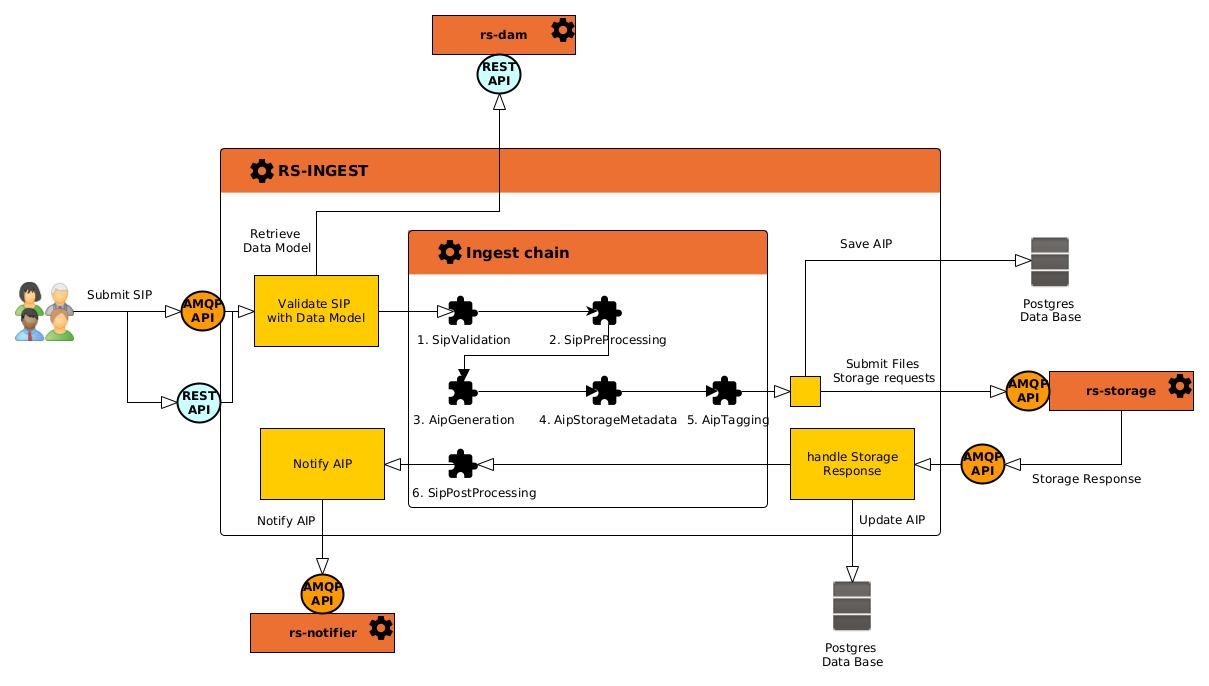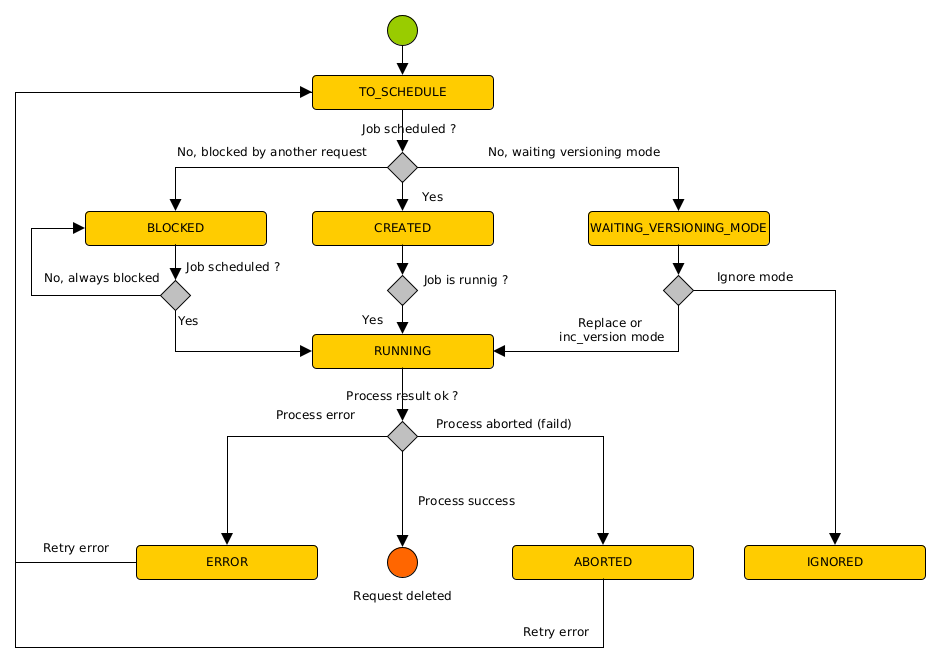How it works
Introduction
Products creation requests can be submitted with SIP formated requests
through AMQP API or REST API
to rs-ingest microservice.
AMQP API is strongly recommended to increase service performances when a big amount of requests is sent.
When a SIP request is received (AMQP or REST API), request is saved in the microservice database and will be processed by schedulers and Jobs as described in Requests and Jobs processing concept overview.
When a SIP or Submition Information Package is handled by rs-ingest service, it is transformed to an AIP or Archival Information Package by adding :
- Metadata
- Tags
- History
- Files storage information
The main concept to understand how rs-ingest microservice handles SIP is Ingestion chains.
Ingestion chains are configurable
workflows to define the way SIP requests will be handled. It is a succession of plugins.
The here under diagram explains :
- Concept of Ingest chain with Plugins
- Workflow to handle a SIP request.

SIP creation requests can be in different states. The following diagram explain these states.

Ingest chain
The Ingest chain is the main configurable item in the rs-ingest microservice to define how SIPs will be handled.
Administrators can configure one or many Ingest chains as
described here.
The Ingest chain used to process a SIP is defined in the metadata section of the request as described in AMQP guide or REST Guide.
All steps of an Ingest chain are implemented by a plugin in order to be able to customize behavior for each project and mission. Steps of an Ingest chain are :
- SIP validation : to valid input SIP metadata and/or associated files.
- SIP Pre processing : apply a process before the SIP is transformed to an AIP.
- AIP Metadata Generation : transform the SIP metadata to insert them into the AIP.
- AIP Storage Metadata Generation : transform files storage location information.
- AIP Tagging : add some tags to the output AIP.
- SIP Post processing : apply a process once the AIP is fully stored.
During all the process, the SIP entity status can be :
INGESTED: The SIP as been validated and AIP is generated.STORED: The files of the AIP associated to the SIP have been successfully stored with thers-storageservice. If the SIP and the AIP are not associated to any file, then theSTOREDstatus is immediately set without waiting forrs-storageresponse.DELETED: The SIP has been deleted without the irrevocably option. With the irrevocably option set, the entity is fully deleted from database (and not just marked as deleted).
When a SIP is in INGESTED state, the AIP entity is created. The AIP status can be :
GENERATED: The AIP has been successfully generated by the AIP Metadata Generation PluginSTORED: The files of the AIP are successfully stored or the AIP does not contain any files.DELETED: The AIP as been deleted without the irrevocably option. With the irrevocably option set, the entity is fully deleted from database (and not just marked as deleted).
Model validation
A submitted SIP requests can provide an associated Data Model in its metadata section as described
in AMQP guide or REST Guide. If
no model is defined in the submitted SIP, no validation is done. To do this model validation, rs-ingest microservice
keep a cache of Data Models retrieved from the rs-dam microservice.
Model validation checks for attributes in the properties.descriptiveInformation section of the SIP to be compliant with attributes defined in the given Data Model. Validation checks for :
- Mandatory attributes,
- Attributes values types
- Attributes values restrictions
Attributes of the data model are validated with case sensitiveness on attributes labels.
Versioning
SIP (and associated AIP) versioning is handled by the rs-ingest microservice. To do so, the SIP (and AIP)
providerId
is used. When a SIP is submitted with a providerId that already exists the service will try to handle versioning with
four possible methods IGNORE, REPLACE, INC_VERSION or MANUAL. The versioning method is provided in
request
metadata.versioningMode section.
These four methods of versioning are :
- IGNORE : The ingest request is simply ignored, nothing more is being done.
- INC_VERSION : The new SIP and AIP are created with an incremented version.
- REPLACE : The new SIP and AIP are created with an incremented version. And when new AIP is fully created and stored, the original SIP and AIP versions are deleted.
- MANUAL : With this versioning method, the SIP is not created. The request remains in WAITING_VERSIONING_MODE status waiting for an administrator to manually select the versioning mode between the two first ones REPLACE or INC_VERSION by using the administration UI.
The unique identifier of a SIP or an AIP is generated by the rs-ingest microservice, it's its URN
(Uniform Resource Name). This identifier contains the entity version.
The Ingest representation of an URN is URN:<entity>:<type>:<tenant>:<uuid>:V<version> with :
- entity : AIP or SIP
- type : DATA, DATASET or COLLECTION
- version : entity version
"urn":"URN:AIP:DATA:project1:c6487db8-9955-3917-a7e2-0374ccde903c:V1"
Errors management
SIP creation requests can specify the way errors are handled with the parameter metadata.replaceErrors. This
parameter is a boolean.
If replaceErrors is set to true and there is already an existing SIP creation request in error state,
as both requests have the same providerId, the previous error request is deleted and replaced with the
new one. Otherwise, the last request is retried.
The default value of this parameter is false if not specified in the submitted SIP.
The default behavior is to keep SIP requests in error state to allow the administrator to retry them. If you prefer to
send a new request instead of retrying the existing one, use the replaceErrors parameter in your request.
Products dissemination
How to ?
If the rs-ingest microservice is configured to notify external components, each created/modified/deleted AIPs are sent
to the rs-notifier microservice to notify external components.
To notify external systems, you need to :
- Activate notification of products in
rs-ingestmicroservice configuration. To do so, see Ingest Configuration - Configure
rs-notifierto set the wanted destination of the notifications. To learn how to users-notifiermicroservice see Notification service
Nevertheless, if automatic notification is not activated, or if you want to re-notify some AIP, you can manually notify the selected AIPs using the admin UI. To do so, see [AIP Dissemination](../../.. /user-documentation/4_1-ingest/oais-dissemination.md).
When a notification is sent to a recipient by notifier service, the dissemination information of the notified AIP is
updated by the rs-ingest microservice with :
- recipient label : Name of the recipient of the notification (as configured in
rs-notifierservice) - dissemination date : Date of the notification
- acknowledge date : Date of the received acknowledgement. If the recipient is not configured to send
acknowledgements, this date is the same as the dissemination date. If the recipient is configured to send
acknowledgements, this date is the date when the acknowledgement is received. This acknowledgement parameter is
configured in the
rs-notifierservice for each recipient.
With those information, Regards administrators can view all recipients of AIPs notifications using the administrator UI.
Products notification format
All notifications of products in the OAIS catalog are sent to the Notifier microservice using the same formalism
indicated below and in accordance with the format expected by the Notify service.
The notification format is very important to understand how to configure the notifier microservice to dispatch the products to the configured recipients.
| Parameter | Type | Description |
|---|---|---|
| metadata | Object | Metadata about the product notification |
| metadata.action | String | Type of product notification. Possible values are : INGEST: New product created. OAIS_DELETION: Product deleted. UPDATE : Product updated. AIP_DISSEMINATION: Product manually notified. |
| metadata.sessionOwner | String | Owner of the product. |
| metadata.sessionOwner | String | Session in which the product has been created. |
| payload | Object | The product to broadcast |
| payload.id | Number | The internal Regards database product identifier |
| payload.aipId | String | The unique identifier of the product in URN format. |
| payload.state | String | Product state as described in the Ingest chain section |
| payload.storages | List<String> | Storage locations of the product files. They correspond to storage spaces configured on the storage service. |
| payload.last | Boolean | Is the product the latest version? |
| payload.disseminationStatus | String | Product notification status. Possible values are : NONE PENDING DONE. |
| payload.sessionOwner | String | Session owner of the product |
| payload.session | String | Session name in which the product has been created. |
| payload.categories | List<String> | List of optional categories of the product. |
| payload.tags | List<String> | List of optional categories of the product. |
| payload.creationDate | DATE_ISO8601 | Creation date of the product. |
| payload.lastUpdate | DATE_ISO8601 | Last update date of the product. |
| payload.aip | AIP | AIP as describe in OAIS appendice |
{
"metadata": {
"action": "INGEST",
"session": "Test owner",
"sessionOwner": "Session of 2024-06-14"
},
"payload": {
"id": 177,
"aipId": "URN:AIP:DATA:validation:098f6bcd-4621-3373-8ade-4e832627b4f6:V1",
"state": "STORED",
"storages": [
"Local"
],
"last": true,
"disseminationStatus": "NONE",
"sessionOwner": "Test owner",
"session": "Session of 2024-06-14",
"categories": [],
"tags": [
"TAG_001"
],
"creationDate": "2024-06-14T10:38:08.05868Z",
"lastUpdate": "2024-06-14T11:03:09.826293Z",
"aip": {
"type": "Feature",
"id": "URN:AIP:DATA:validation:098f6bcd-4621-3373-8ade-4e832627b4f6:V1",
"sipId": "URN:SIP:DATA:validation:098f6bcd-4621-3373-8ade-4e832627b4f6:V1",
"providerId": "Product001",
"version": 1,
"ipType": "DATA",
"geometry": {},
"properties": {
"contentInformations": [
{
"dataObject": {
"regardsDataType": "RAWDATA",
"filename": "regards-2296-data-1.dat",
"locations": [
{
"storage:": "Local",
"url": "file:///regards-input/validation/data/2296/regards-2296-data-1.dat"
}
],
"checksum": "9a964ed3be0e2e2786d82ace9d971e90",
"algorithm": "MD5"
},
"representationInformation": {
"syntax": {
"name": "TEXT",
"mimeType": "text/plain"
}
}
}
],
"pdi": {
"contextInformation": {
"tags": [
"TAG_001"
]
},
"provenanceInformation": {
"history": []
},
"accessRightInformation": {}
},
"descriptiveInformation": {
"property1": 11056,
"date": "2018-01-20T17:22:48Z"
}
}
}
}
}
Products dissemination acknowledge
External systems who subscribe to AIP notifications from the rs-ingest service can send back an acknowledgment to
inform that the notification has been successfully handled. To do so, refer
to AIP notification acknowledge guide.
With this system Regards administrators can validate using the administrator UI that notifications has been successfully handled by recipients.
AIP dump
The rs-ingest microservice provides a dump functionality of all the AIPs referenced in its catalog. Incremental dumps are done every time the dump cron is activated. The first time, all AIP are added into the dump file. The dump file is a zip archive containing AIP in json format.
You can configure dump options